|
|
|
Sort Order |
|
|
|
Items / Page
|
|
|
|
|
|
|
| Srl | Item |
| 1 |
ID:
123511
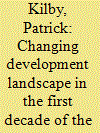

|
|
|
|
|
| Publication |
2012.
|
| Summary/Abstract |
The first decade of the 21st century has been characterised by complex and interrelated changes that have affected development. Development studies as a discipline has traditionally been concerned with the impact of colonisation and neocolonialism, and with neoliberal-related growth models. This paper argues that, since around the turn of the century, there has been a major shift in development, driven by a series of fundamental changes, including the relative failure of the neoliberal project in the 1980s and 1990s, which by the 2000s was partly replaced by a greater concern with addressing security issues with aid; the rise of China and other middle-income countries as large resource providers for development; and the rapid increase of remittance flows to lower and middle income countries. The paper looks at how both development studies and aid policy in Australia and elsewhere have been relatively slow to engage with this rapidly changing context. The big challenges for development studies will be: engaging with developing countries as development donors with different agendas for development; the decline of much of the current neoliberal paradigm; alternative sources of development finance; and the securitisation of Western aid.
|
|
|
|
|
|
|
|
|
|
|
|
|
|
|
|
| 2 |
ID:
126659
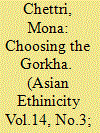

|
|
|
|
|
| Publication |
2013.
|
| Summary/Abstract |
The Darjeeling hills in northern West Bengal, India are being demanded as a homeland for the Gorkha community living in India. While the origin of Darjeeling is steeped in the imperial legacy of the British Raj, the Gorkha, a colonial construct is ironically used as a means to challenge the contemporary political regression and neo-colonisation of Darjeeling. Although the Gorkha identity is deemed as representative of the Nepali community residing in India, it acquires special meaning and importance in the Darjeeling hills, where majority of the people suffer low wages, unemployment, underdevelopment and poverty. In spite of a large working force in the tea estates, economic underdevelopment and political disempowerment is voiced through the assertion of ethnic rather than a class-based identity. Through an examination of the interaction between class and ethnicity, the Gorkha identity will highlight the malleability of ethnicity to extend itself to any situation and the emergence of an ethnic identity from class relations and grievances.
|
|
|
|
|
|
|
|
|
|
|
|
|
|
|
|
| 3 |
ID:
131931
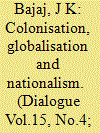

|
|
|
|
|
| Publication |
2014.
|
| Summary/Abstract |
Globalization is a product of the so-called age of European enlightenment. As soon as the Europeans came across the sail, the compass and the gun-power, they put the three together on ships and boats and embarked upon voyages of discovery and conquest. The nature and intent of these voyages may be inferred from the proclamation made by king Henry VII of England in 1480, at the very beginning of this age, granting to one john Cabot and his sons, 'and to the heirs and deputies of them, full and free authority, faculty and power to sail to all find, discover and investigate whatsoever island, countries, regions or provinces of heathens and infields, in whatsoever part of r=the world placed, which before this time were unknown to all Christians'.
|
|
|
|
|
|
|
|
|
|
|
|
|
|
|
|
| 4 |
ID:
123509
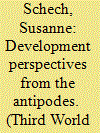

|
|
|
|
|
| Publication |
2012.
|
| Summary/Abstract |
Is there a distinctive Antipodean approach to development? In this introduction I take up Raewyn Connell's challenge to explore the possibilities for knowledge production that reflects Australia's and New Zealand's geographical situation of rich peripheral countries and their history of settler colonisation. While Antipodeans' contributions to development theory have been limited, their work is characterised by close connections between theory and practice. The Antipodes' positioning as global North in the geographical South has stimulated a search for alternative approaches to development knowledge. This is variously pursued through collaborative research relationships with indigenous communities, close engagement with non-Western cultural frameworks, and a focus on marginal spaces and positions. As the centre of global economic power shifts to the South, existing development relationships and established ways of doing development are increasingly challenged by newly constituted subject positions and coalitions.
|
|
|
|
|
|
|
|
|
|
|
|
|
|
|
|
| 5 |
ID:
153669
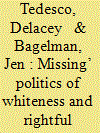

|
|
|
|
|
| Summary/Abstract |
This article engages the global nexus of colonisation, racialisation, and urbanisation through the settler colonial city of Kelowna, British Columbia (BC), Canada. Kelowna is known for its recent, rapid urbanisation and for its ongoing, disproportionate ‘whiteness’, understood as a complex political geography that enacts boundaries of inclusion and exclusion. The white urban identity of Kelowna defines Indigenous and temporary migrant communities as ‘missing’ or ‘out-of-place’, yet these configurations of ‘missing’ are politically contested. This article examines how differential processes of racialisation and urbanisation establish the whiteness of this settler-colonial city, drawing attention to ways that ‘missing’ communities remake relations of ‘rightful presence’ in the city, against dominant racialised, colonial, and urban narratives of their absence and processes of their displacement. Finally, this article considers how a politics of ‘rightful presence’ needs to be reconfigured in the settler-colonial city, which itself has no rightful presence on unceded Indigenous land.
|
|
|
|
|
|
|
|
|
|
|
|
|
|
|
|
|
|
|
|
|